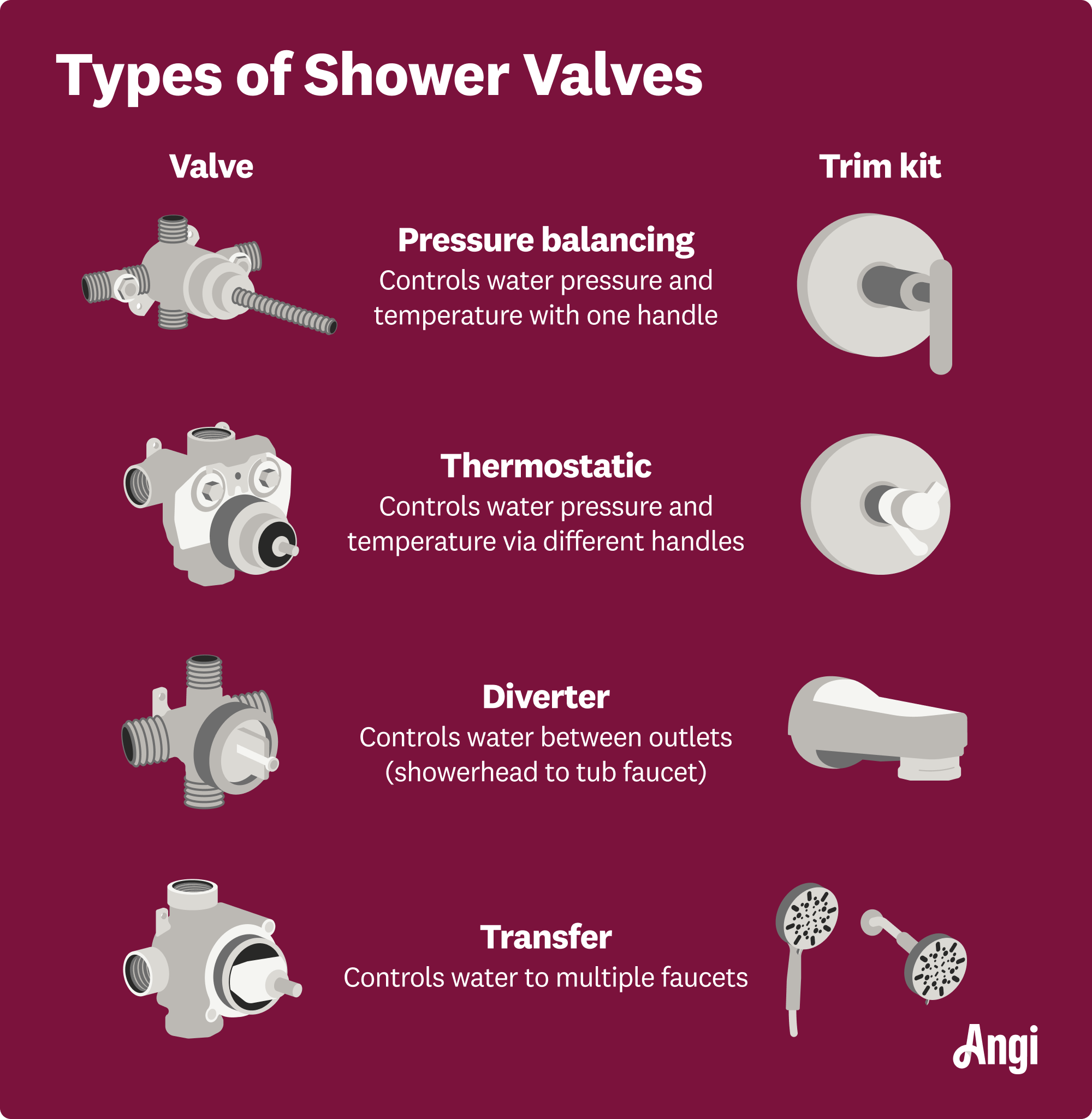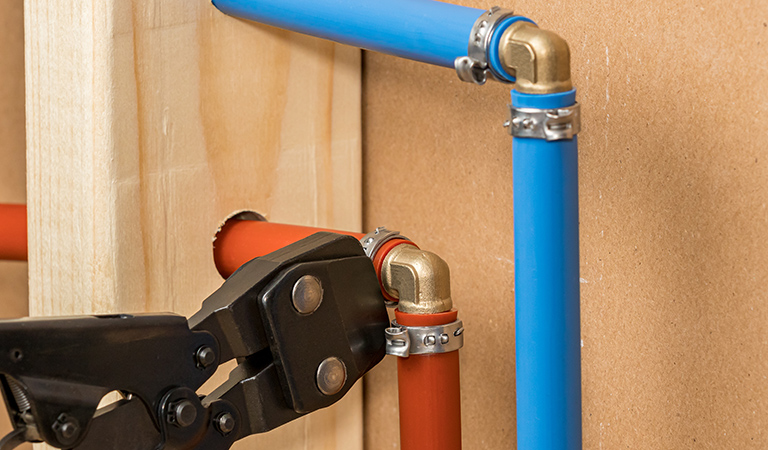
The average cost to replace a bathroom faucet typically ranges from $170 to $360. Faucet installation costs often vary based on the selected fixture hardware.
Plumbing costs depend on your project and location. Check with a local pro for your specific job.
The type of shower valve you choose is the most significant cost factor to consider, with pressure-balancing valves costing up to twice as much as simpler options.
Replacing a shower valve is a simple process, so labor plays just a minor role. It’s more cost-effective to have a pro do the work because it’s not much more expensive.
It’s often more affordable to repair your existing shower valve, but a full replacement is a better option over time because it reduces the risk of future leaks.
Consider upgrading your shower fixtures at the same time to save. Your pro will need to remove some of the fixtures anyway.
Shower valve replacement costs $350, on average, with a range between $150 and $550. The price to replace a shower valve depends on the type of valve you choose, which parts of the system you need to replace, and whether you DIY or hire a pro.
The shower valve is the most crucial part of the shower besides the water itself. Without this valve, you wouldn’t be able to control the temperature and water pressure and enjoy your relaxing shower or bath after a long day. Find a breakdown below of all the costs involved with replacing your shower valve.
With the right shower valve, you can say goodbye to scalds, chills, and sudden pressure changes. Here are the factors that determine how much you’ll pay to replace a shower valve.
The cost to replace your shower valve depends on the type you need. Here are the five most common ones with cost estimates.
| Shower Valve Types | Average Cost |
|---|---|
| Mixing valve | $40–$350 |
| Diverter shower valve | $20–$200 |
| Pressure-balancing valve | $50–$300 |
| Thermostatic shower valve | $25–$200 |
| Transfer valve | $100–$190 |
Mixing valve: Mixing valves combine hot and cold water so you can adjust the temperature and cost $40–$350. However, mixing valves can’t account for sudden water pressure changes, so the water temperature can fluctuate if someone flushes the toilet while you’re in the shower.
Diverter shower valve: Diverter shower valves redirect water flow between one or more water outlets, like a showerhead and a bathtub spout, and allow you to switch between them. These are common in tub-and-shower combos and cost $20–$200.
Pressure-balancing valve: These valves maintain consistent water temperature by adjusting the balance of hot and cold water to compensate for pressure changes in the water supply. Unlike mixing valves, water from pressure-balancing valves won’t suddenly change temperature if the water pressure changes while you’re using the tap or shower. This type of valve averages $50–$300.
Thermostatic shower valve: Thermostatic shower valves control water temperature by letting you set and maintain the heat level you prefer regardless of water pressure. These valves automatically adjust the water to your preset temperature to avoid scalding or freezing showers and range from $25–$200.
Transfer valve: These valves direct water to multiple outlets, such as a showerhead, hand shower, spigot, and body jets. With transfer valves, you can choose to have water coming out of more than one fixture, outlet, or spout at a time. Expect to pay $100–$190.
If you aren’t sure which type of shower valve you have, look for a serial number or model number on the showerhead and search for it online.

How many handles does your shower have? The price you pay to fix your shower valve may depend on that answer.
Ranging from basic to high-end, your shower valve could cost under $20 or over $100 depending on the one-handle valve you opt for.
Two-handle shower valves aren’t as common today as they used to be. The kits for them are the most affordable of any shower valve type and may only cost a few dollars.
Often used for aesthetic value or in older showers, three-handle shower valves are less frequently seen in modern bathroom showers. A basic kit will cost under $30.
You can hire a handyperson or licensed plumber for this project. If you hire a handyperson near you, expect to pay around $165 for a shower valve replacement. You should bring in a local plumbing repair pro if you’re upgrading to a different system, which will cost around $225 for a shower valve replacement.
You have two options here: replacement parts or a shower valve kit. Buying individual replacement parts might save you a couple of bucks and prevent you from having to replace the parts of your shower valve that still work. However, especially on older shower valves, it can be difficult to find some pieces.
A shower valve kit contains all the parts to replace your shower valve, new trim that matches the valve, and some include a new showerhead. A basic shower valve kit costs under $30, whereas fancy units cost $100 or more.
It can be more challenging to access valves through the walls in older homes than in newer homes. This could add time—and labor costs—to your bill. Expect to pay about an hour in labor if yours is older or difficult to reach.
Working on your home’s plumbing, whether you do the work DIY or hire a contractor, requires a permit in some states and counties. A “faucet permit,” as this type of work may be classified, costs anywhere from $10 to $25.
You might be able to fix small leaks or a minor decrease in water pressure with a simple shower valve repair, such as adding a new O-ring (or tightening a pipe).
Alternatively, if there are serious leaks, decreases in water pressure or temperature that make showering difficult, or odors coming from the shower valve, you’ll most likely need to replace it. Repair costs depend on the type of fixes required to get it back in working order.
Replacing a shower valve often requires opening the wall, handling pressurized water lines, and making watertight connections that won’t leak. That’s why it’s best to hire a local plumbing repair pro for the job. A plumber will ensure proper installation to prevent issues like hidden water damage, mold inside the wall cavity, inconsistent water pressure, and premature valve failure.
When replacing a shower valve, you should hire a pro for these reasons:
Plumbers are familiar with local plumbing codes and know which valve types are approved for your home.
They can shut off and reconnect water lines safely without damaging surrounding pipes.
Licensed pros install valves at the correct depth so trim, handles, and future repairs fit properly.
DIY mistakes can cause leaks inside the wall that go unnoticed until major damage appears.
Professionals test the pressure balance and temperature limits to ensure the valve performs safely.
A plumber can determine what type of valve you need based on your shower setup.
To streamline the project and potentially reduce labor costs, you can handle these simple prep tasks:
Clear the shower area by removing toiletries, shelving, and accessories
Decide on your handle style, finish, and trim kit before installation begins
Mark your preferred height for the shower handle or any planned fixture upgrades
Plan ahead for any tile or wall repairs that may be needed once the valve is replaced
Make sure the plumber has clear access to any crawl spaces, utility rooms, or access panels behind the shower
Shower valve replacement is pretty straightforward. But like most home improvement costs, a little foresight and research will save you cash. Here are two strategies for paying less to replace a shower valve:
Stick with the basics: Shower valves can become pricey quickly. If you’re trying to save money, stick with a basic model that fits your cartridge.
Call multiple plumbers: Plumbers charge varying hourly rates, and $45–$200 per hour is standard but not guaranteed. You might be able to find a skilled plumber for less if you research before you hire.
Ask your pro whether the new shower valve is compatible with your existing plumbing lines and shower configuration.
Review trim kit options, handle styles, and finishes before the wall is opened.
Confirm the valve will be installed at the correct depth for future servicing.
Discuss potential upgrades. such as thermostatic controls or a diverter for multiple showerheads, before installation begins.
Home is the most important place on earth, which is why Angi has helped more than 150 million homeowners transform their houses into homes they adore. To help homeowners with their next project, Angi provides readers with the most accurate cost data and upholds strict editorial standards. We extensively research project costs to develop the pricing data you see, so you can make the best decisions for you and your home. We rely on reputable sources, including the U.S. Bureau of Labor Statistics, academic journals, market studies, and interviews with industry experts—all to ensure our prices reflect real-world projects.
Want to help us improve our cost data? Send us a recent project quote to [email protected]. Quotes and personal information will not be shared publicly.
From average costs to expert advice, get all the answers you need to get your job done.

The average cost to replace a bathroom faucet typically ranges from $170 to $360. Faucet installation costs often vary based on the selected fixture hardware.

Pipe leak repair costs depend on the location and severity of the leak, as well as the type of pipe being replaced. Use our guide to price out repair work.

How much does hydro jetting cost? Learn hydro jet drain cleaning prices based on factors like the extent of the clog, accessibility, and more.

Learn how to cut PVC pipe with ease and efficiency. Our guide will show you how to tackle your PVC pipe project like a pro.

Discover the average plumbing stack replacement cost, key price factors, and expert tips to help you budget for your home’s plumbing upgrade.

Frozen underground pipes can lead to costly damage to your home. Use this guide to learn how to safely thaw them, prevent future freezes, and protect your home from expensive water damage.